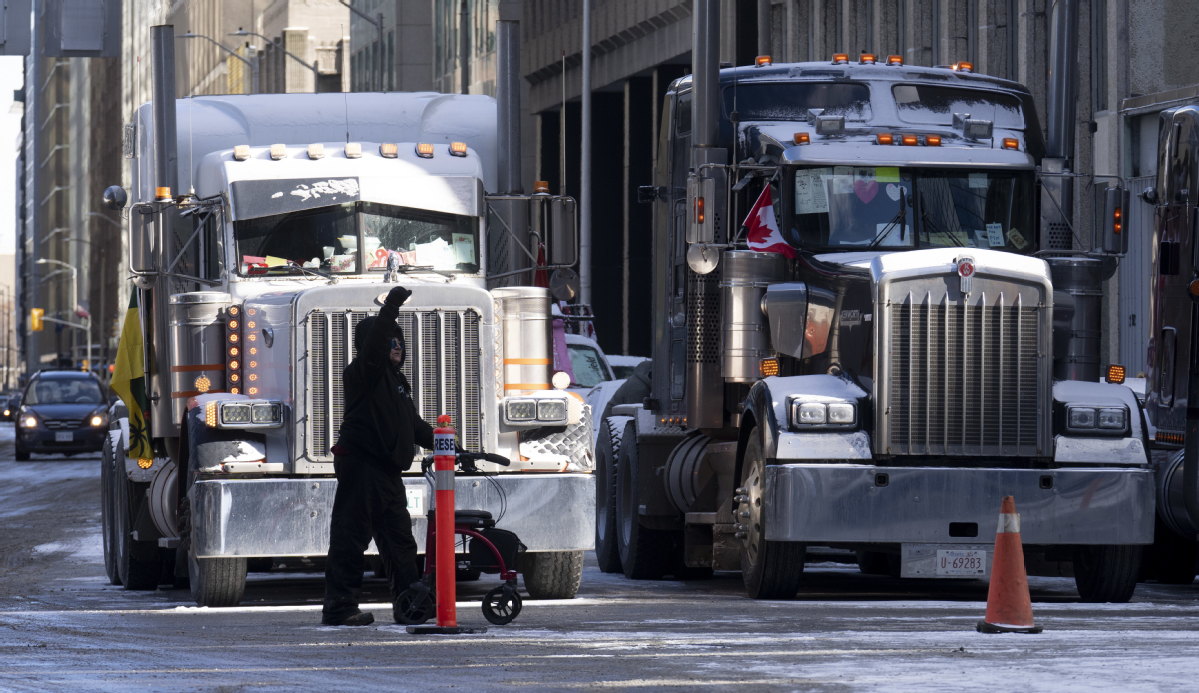Pain from truck protests in Canada spread slowly in trade and recovery






Authorities across Canada finished clearing up blockaded border crossings on Feb 16, opening the flow of trade and helping the Canadian and US economies breathe a little easier but still reeling from hundreds of millions of dollars in unexpected costs.
Experts say it may take months for industries, particularly the automotive and agricultural sectors, to recover from the fallout of the weeks-long blockades.
The blockades were part of a wider protest movement against vaccine mandates, mask-wearing requirements and other COVID-19 related restrictions, demonstrations that have been dubbed "Freedom Convoy".
The protest convoy of truck drivers started out in the westernmost Canadian province of British Columbia on Jan 22 and made a 3,500-kilometer journey to the national capital Ottawa. Protesters have remained in the city for almost three weeks now.
Spin-off protests in solidarity with the Freedom Convoy over the past two weeks included blockades of several crucial border crossings between the United States and Canada. Half a dozen border crossings in four provinces across Canada were blocked at different times, making crossing the border difficult and trade more expensive.
Prime Minister Justin Trudeau opened the door for authorities to take stronger action against the blockades when he invoked the Emergencies Act on Feb 14. The last of the blockades in Emerson, Manitoba, ended on Feb 16. Other blockades in Coutts, Alberta; Surrey, British Columbia; and at the Ambassador Bridge in Windsor, Ontario — the busiest US-Canada border crossing — have been cleared since the weekend.
"Throughout the past six days, our officers continued to use open communication, and a measured approach to find a peaceful resolution to this situation," said Chief Superintendent Rob Hill of the Manitoba Royal Canadian Mounted Police in Emerson.
Even though blockades have been cleared, the protest occupation in Ottawa against vaccine mandates and other pandemic-related restrictions headed into its third week and a lot of the economic damage has already been done and may be felt for months.
"Canada's critical trade and transportation infrastructure is vital to the lives and livelihoods of all Canadians, and governments must find a way around these conflicts going forward," the Retail Council of Canada in a statement.
"At the end of the day, there is an ironic twist that current protests across the country are portrayed as being about choice, and yet they are actually likely to reduce choices for Canadian consumers and drive costs up for families."
On Feb 16, day 20 of the occupation, hundreds of trucks and other vehicles remained on Ottawa's central Wellington Street, which fronts the country's Parliament complex.
Tourism and hospitality industries have already been badly hurt by the COVID-19 pandemic over the past two years and will continue to be hurt by the blockades.
And the broader cost of the protests and blockades, already in the hundreds of millions of dollars, continues to climb.
"The disruptions have caused a threat to our economy and public safety, and they are hurting farmers, small businesses and our communities across the country," Canada's Minister of Agriculture and Agri-Food Marie-Claude Bibeau said in a statement.
Shipments of livestock were delayed or cancelled altogether, and the risk of food being spoiled rose significantly.
For agricultural producers, the blockades represented yet another hit after a year marked by the pandemic, drought, floods and myriad transportation issues, the Canadian Agri-Food Trade Alliance has noted.
The auto industry alone estimates it has lost close to a billion dollars.
"Within hours of the trade disruption at the Ambassador and Blue Water bridges, we observed shortages and then slowdowns at assembly plants," Patrick Anderson, CEO of Michigan-based Anderson Economic Group, said in a statement.
"Only some of the lost production can be made up given the tightness of the auto industry's supply chain right now, so these are real losses."
Following the Freedom Convoy and other solidarity protests, the Canada Border Services Agency was forced to stop services for several days at various crossings in the provinces of Ontario, Alberta, Manitoba and British Columbia. A lot of the $1.7 billion in trade that happens every day between Canada and the US moves through these border crossings.
The blockades have increased the costs of food and cars at a time when inflation is particularly high. Statistics Canada, the national statistics agency, reported on Feb 16 that inflation in January rose to 5.1 percent, its highest level since 1991.
North America's auto industry may lose as much as $988 million from the blockades. Research firm HIS Markit estimates that $141.1 million in vehicles and parts flow daily through the Ambassador Bridge, where a blockade was in place for almost a week until Feb 13.
Ford Motor Co, General Motors and Toyota Motor Corp all were forced to cut production at some plants in the continent. Ford was forced to shut at least one plant due to a shortage of parts caused by the blockade. Toyota said the protests affected four plants in Ontario, Kentucky, Alabama and West Virginia.
The latest disruptions have only added to the woes of the industry that was already suffering from a global chip shortage.
The writers are freelance journalists for China Daily.





























